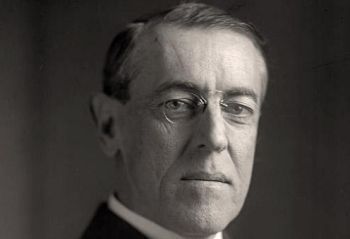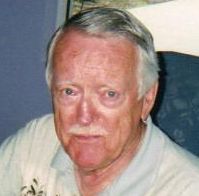
Publisher:
Bonnie King
CONTACT:
Newsroom@Salem-news.com
Advertising:
Adsales@Salem-news.com

~Truth~
~Justice~
~Peace~
TJP
Apr-19-2014 16:05

 TweetFollow @OregonNews
TweetFollow @OregonNews
We Have Wilson to Thank for it... Let Freedom Ring (Democrats Always Ring Twice)
Bill Annett Salem-News.comWoodrow Wilson was a real bug about freedom, so we owe him a lot.
 Woodrow Wilson photo courtesy: realclearpolitics.com |
(DAYTONA BEACH) - According to Jonathan Turley, a professor of law at George Washington University, the freedoms we spend so much time and ink blubbering about are rapidly being eroded, often in the interest of that national security of which our freedom is the cause celebre. A year or two ago, our President, a mild-mannered former street-community worker from Chicago who critics feared lacked the stamina or resolve to be a Commander-in-Chief, flushed from his triumph in engineering the whacking of Osama bin Laden, signed into law a bill that legalized the detention of any citizen on suspicion of treasonous acts or operating counter to the national interest.
Oddly, that wasn't a recent phenomenon tracing its origin to the “compassionate conservatism” of George Bush. During the reign of Woodrow Wilson, (Democrat, Baptist preacher, lawyer and Ph.D., not necessarily in that order), specifically after he was persuaded to get into World War I just in time to dictate the terms of the Armistice, if I - or any other citizen - had repeated all or part of the above paragraph, I or that citizen could have been clapped in durance vile for a treasonous act. One guy in 1917 actually got ten years for criticizing in writing the BRITISH war effort. They were our allies at the time, (not to mention more recently during the Iraqi unpleasantness) but traditionally were our hated oppressors, responsible for the Second Amendment.
Woodrow Wilson was a real bug about freedom, so we owe him a lot. During the war, he focused on diplomacy and financial considerations, leaving the fighting primarily in the hands of the Army, especially the Army of France and the Army of Great Britain and even the Army of colonial Canada, where the colonials have been very warlike ever since the French and Indian War.
Wilson was considered an intellectual, unusual for a U.S. President. In fact, he was the only president with a Ph.D. (although Teddy Roosevelt is sometimes considered to have been an intellectual because he was on the boxing team at Harvard and was able to recite “Young Lochinvar, ” especially after a few drinks. Wilson, on the other hand, didn't drink).
On a personal level, Wilson's father defended slavery, owned slaves and set up a Sunday School for them. He also cared for wounded soldiers at the local church, and sometimes even wounded slaves (In a separate building, of course). The elder Wilson also briefly served as a Confederate Army chaplain, so the boy Woodrow grew up with a seriously conflicted attitude toward war.
His earliest memory, from the age of three, was of learning that Abraham Lincoln had been elected and that a war was coming. Perhaps that was the earliest influence that determined that the boy Woodrow Wilson should become a Democrat. Wilson would forever recall standing for a moment at the side of Robert E. Lee and deciding that he looked somewhat like Santa Claus, definitely a leftist sort of idol.
Wilson attended Princeton for a short period when his father was on the faculty. As a result of that family connection, he was not only graduated prematurely but earned a Ph. D. after a semester or so and completing a dissertation on the evils of alcohol.
In 1879, Wilson attended law school at the University of Virginia for one year and that, together with his political connections, enabled him to practice law, beginning in 1882 in Atlanta. In October he passed the Georgia Bar, although he never entered another bar in his life.
Wilson's mother was a hypochondriac, which perhaps accounts for the fact that he complained about his poor health more than was necessary. It is true that he suffered from hypertension in his youth and actually had his first stroke when he was only 39. He spent three years trying to keep America out of World War I, unlike Franklin Roosevelt who later spent three years trying to get America into World War II. Wilson first tried to be a mediator, pointing out his skills as a Georgia lawyer, but none of the European combatants took him seriously. Perhaps they'd heard about Georgia lawyers.
His main mediation effort was to ask both sides what their minimum requirements would be to achieve peace. The Germans said “the total dismemberment of the French and British Empires.” The French and the English responded: "the German nation must be reduced to its 15th Century borders," when Old High German was the official language. The Kaiser was enraged, thinking that they were referring to him as “the Old High German" just because of his predilection for schnaps.
The Peace talks collapsed, and so did Wilson, with another stroke. Earlier, he had tried reducing the size of the Army as a means of having nothing with which to enter the War. That succeeded only in angering the Republicans who believed in war at any cost, particularly against Germans. As the controversy raged on, Wilson and the First Lady won the support of women, churches and the Mafia, all of whom believed that peace would hasten the enactment of prohibition.
Wilson's second campaign in 1916 used the major slogan "He kept us out of war," although he didn't, in the end. In his acceptance speech Wilson warned Germany that submarine warfare causing the loss of American lives would not be tolerated. He narrowly won the election but just as narrowly lost the peace.
With all these distractions, Wilson was so confused that the U.S. actually entered the war in 1917 by default when he wasn't looking. In fact, the Germans sank the British ship Lusitania with Americans on board, most of whom had voted for Wilson, so he was justifiably indignant.
Wilson had found it increasingly difficult to maintain U.S. neutrality because Germany had promised to be good in both the Arabic Pledge and the Sussex Pledge, but then went right ahead with its submarine warfare anyway. Wilson, who had himself signed the WCTU Pledge not to drink except at the Inaugural Ball, couldn't tolerate anybody who would break a pledge, which he viewed as un-Christian.
Mr. and Mrs. Wilson had decided by then that the war had become a real threat to humanity. Unless the U.S. threw its weight into the war, they reasoned, western civilization itself could be destroyed. Wilson wanted to build a basis for peace that would prevent future catastrophic wars and needless death and destruction. Mrs. Wilson just had a scunner against Germans, especially German men, because she believed that German women should have equal rights.
It was obvious at the time that the rumors were true, that Mrs. Wilson was really making the major decisions. In any event, the First Lady's reputation as the boss became the ultimate triumph of the Women's Movement, a feat that has never been duplicated since, although Hilary came close in 2008.
Wilson also charged that Germany had infiltrated our unsuspecting communities and even our government offices with spies, and had also attempted to instigate a Mexican attack on the U.S. This was true because even then a constant stream of illegal immigrants was wading across the Rio Grande, particularly at the Rio Grande's shallow spots around Brownsville.
To suppress all anti-war opinion, Wilson advocated the arrest and deportation of all foreign-born radicals and the suppression of newspapers who opposed the Presidency. Mere criticism of the Wilson administration and its war policy became grounds for arrest and imprisonment, so it was almost the end of the Republican Party, which was trying its best to make him a one-term president.
Eugene Debs, who was almost as mild-mannered as Clark Kent, but unfortunately was the Socialist Party Leader and an activist, was called by Wilson “a traitor to his country.” Many recent foreign immigrants, who opposed America's participation in World War I were deported to Soviet Russian gulags. Wilson was in favor of unions, notably those unions that were in favor of him.
Between 1914 and 1918, the United States managed to interfere in Mexico, Haiti, Cuba and Panama, and used garrisoned troops to select the president of Nicaragua. American troops in Haiti, under the direction of Wilson's federal government, forced the Haitian legislature to choose the candidate Wilson selected as Haitian president. American troops occupied Haiti between 1915 and 1934. Wilson ordered the military occupation of the Dominican Republic to protect America's freedom. Apart from that, Wilson's administration adopted a "hands off policy."
After the War, Wilson spent six months in Paris for the Peace Conference, the first U.S. president to travel to Europe while in office. The charter of the proposed League of Nations was incorporated into the Treaty of Versailles. Japan proposed a racial equality clause. Wilson didn't care one way or the other but he went along with Britain and Australia who opposed racial equality in the Pacific and besides he believed that Japan had nothing to do with Europe.
Wilson also visited Pope Benedict in Rome, the first American president, especially a Baptist, and with a Ph.D., to visit the Pope, especially a Benedict.
So we have Woodrow (and Mrs.) Wilson to thank for our freedom.

Bill Annett grew up a writing brat; his father, Ross Annett, at a time when Scott Fitzgerald and P.G. Wodehouse were regular contributors, wrote the longest series of short stories in the Saturday Evening Post's history, with the sole exception of the unsinkable Tugboat Annie.
At 18, Bill's first short story was included in the anthology “Canadian Short Stories.” Alarmed, his father enrolled Bill in law school in Manitoba to ensure his going straight. For a time, it worked, although Bill did an arabesque into an English major, followed, logically, by corporation finance, investment banking and business administration at NYU and the Wharton School. He added G.I. education in the Army's CID at Fort Dix, New Jersey during the Korean altercation.
He also contributed to The American Banker and Venture in New York, INC. in Boston, the International Mining Journal in London, Hong Kong Business, Financial Times and Financial Post in Toronto.
Bill has written six books, including a page-turner on mutual funds, a send-up on the securities industry, three corporate histories and a novel, the latter no doubt inspired by his current occupation in Daytona Beach as a law-abiding beach comber.
You can write to Bill Annett at this address: bilko23@gmail.com
 |
 |
 |
Articles for April 18, 2014 | Articles for April 19, 2014 | Articles for April 20, 2014
Quick Links
DINING
Willamette UniversityGoudy Commons Cafe
Dine on the Queen
Willamette Queen Sternwheeler
MUST SEE SALEM
Oregon Capitol ToursCapitol History Gateway
Willamette River Ride
Willamette Queen Sternwheeler
Historic Home Tours:
Deepwood Museum
The Bush House
Gaiety Hollow Garden
AUCTIONS - APPRAISALS
Auction Masters & AppraisalsCONSTRUCTION SERVICES
Roofing and ContractingSheridan, Ore.
ONLINE SHOPPING
Special Occasion DressesAdvertise with Salem-News
Contact:AdSales@Salem-News.com

googlec507860f6901db00.html



Terms of Service | Privacy Policy
All comments and messages are approved by people and self promotional links or unacceptable comments are denied.
[Return to Top]
©2025 Salem-News.com. All opinions expressed in this article are those of the author and do not necessarily reflect those of Salem-News.com.